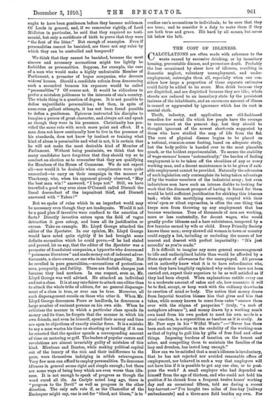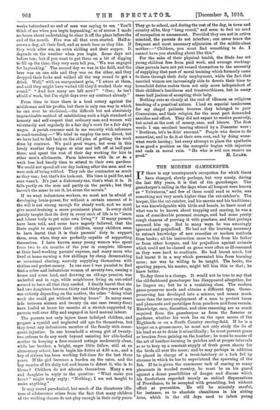1.11h COST OF IDLENESS.
CALCTJLATIONS are often made with reference to the waste caused by excessive drinking, or by insanitary housing, preventable disease, and premature death. Probably the loss occasioned by sheer love of idleness, resulting in domestic neglect, voluntary unemployment, and under- employment, outweighs them all, especially when one con- siders how large a proportion of these separate estimates could fairly be added to its score. Men drink because they are dispirited, and are dispirited because they arc idle ; whole streets are reduced to an insanitary state by the persistent laziness of the inhabitants, and an enormous amount of illness is caused or aggravated by ignorance which has its root in mental sloth.
Thrift, industry, and application are old-fashioned remedies for social ills which few people have the courage to recommend at the present day, lest they should be thought ignorant of the newest short-cuts suggested by those who have studied the map of life from the fiat The cure of physical disease begins to be placed on a rational, common-sense footing, based on adequate study, but the body politic is handed over to the most plausible quack, or the boldest experimentalist. To secure the stability of wage-earners' homes "automatically," the burden of finding employment is to be taken off the shoulders of any or every working man, and a decent maintenance is to be given if suit- able employment cannot be provided. Naturally the advocates of such legislation only contemplate its being taken advantage of by the weaker members of the industrial army ; but even industrious men have such an intense dislike to looking for work that the dimmest prospect of having it found for them would be held sufficient justification for shirking this irksome task; while this mortifying necessity, coupled with their wives' open or silent reproaches, is often the one thing that keeps men from throwing up any employment that has become wearisome. Tens of thousands of men are working, more or less contentedly, for decent wages, who would greatly prefer idleness and a bare subsistence, tempered by a few luxuries earned by wife or child. Every Friendly Society knows these men; every shrewd old woman in town or country could supply a, list, including or excluding the names of her nearest and dearest with perfect impartiality : "It's just a,ccordin' as you're made."
It is difficult to imagine any more general encouragement to idle and undisciplined habits than would be afforded by a State system of allowances for the unemployed. All persons set in authority know what it is to have subordinates who, when they have lengthily explained why orders have not been carried out, expect their superiors to be as well satisfied as if they had been obeyed. When explanations entitle every one to a moderate amount of cakes and ale, how eccentric it will be to find, accept, or keep work with the ordinary drawbacks to exertion of mind or body. The notion that money drawn from Imperial taxation blesses him that gives and him that takes, while money known to come from rates "smears them over with the stigma of pauperism" (truly, "a mob of metaphors advance "), and money drawn by a working man's own hand from his own pocket to meet his own needs is• cruel exaction, is a superstition as baseless as it is costly. As Mr. Parr says in his "Wilful Waste" :—"Never has there been such an imposition on the credulity of the working-man as that of trying to gull him by gifts of free food and other things. Imposing burdens of taxation on the honest and sober, and compelling them to maintain the families of the lazy and drunken, has lasted long enough."
How can we be satisfied that a man's idleness is involuntary, that he has not rejected nor avoided reasonable offers of employment, nor behaved in such a way that employers will not have him if it is possible to get any one else, or to post- pone the work? A small employer who had depended on himself from the age of thirteen, and who could not hold his position if he shrank from a frequent twelve hours' working day and an occasional fifteen, told me daring a recent hay-harvest I've bought two miles of line-hay [railway embankments] and a three-acre field besides my own. For
weeks beforehand no end of men was saying to me, 'You'll think of me when you begin haymaking,' so of course I made no bones about undertaking to clear it off the place before the end of the month. Five was all that even started. Half-a- crown a day, all their food, and as much beer as they like. If they work after six, an extra shilling and their supper. It depends on the weather when you begin. Some days not before ten; but if you want to put them on a bit of digging to fill up the time, they very soon tell you, 'We was engaged for haymaking.' The second day we was in the field, and the beer was on one side and they was on the other, and they dropped their forks and walked all the way round to get a drink. Well," with an unrepentant grin, "I swore at them, and said they might have waited till they'd worked their way round." "And how many are left now ?" "One; he isn't afraid o' work, but I'm eight days over my contract already."
From time to time there is a loud outcry against the middleman and his profits, but there is only one way in which he can ever be abolished,—the difficult but not absolutely impracticable method of establishing such a high standard of honesty and self-respect that ordinary men and women will voluntarily and regularly do a fair day's work for a fair day's wages. A parish overseer said to me recently with reference to road-meuding :—" We tried to employ the men direct, but we have had to fall back on the old plan of getting the work done by contract. We paid good wages, but even in this
. lovely weather they began at nine and left off at half-past three, and spent the rest of their day working for hire in other men's allotments. Farm labourers with 3s. or 4s. a week less had barely time to attend to their own gardens. We could not spend all our day looking after the men, and we were aick of being robbed. They rob the contractor as much as they can; but that's his look-out. His time is paid for, and ours wasn't. It's just a dishonesty-tax, that's what it is. It falls partly on the men and partly on the parish ; but they haven't the sense to see it, let alone the morals."
If we want industrious workers, we must not be afraid of developing brain-power, for without a certain amount of it the will is not strong enough for steady work, and we must give moral training a more prominent place. Is every child plainly taught that its duty in every rank of life is to "learn and labour truly to get mine own living " ? If many parents have been told, and some have eagerly believed, that the State ought to support their children, many children seem to have learnt that it is their parents' duty to support them, even when they are perfectly capable of supporting themselves. I have known many young women who spent from two to six months of the year in complete idleness at their hard-working parents' expense, and many more who lived at home earning a few shillings by cheap dressmaking or occasional charing, scarcely supplying themselves with clothes and pocket-money. In one case I was puzzled to find that a sober and industrious woman of seventy-two, owning a house and some land, and drawing an old-age pension, was underfed and in rags, while neighbours living on out-relief seemed to have all that they needed. I finally learnt that she had two daughters between thirty and thirty-five years of age, one entirely depending on the mother, the other "doing what work she (amid get without leaving home." In many eases lads between sixteen and twenty (in one case twenty-four) have loafed at home for months at a stretch supported by parents well over fifty and engaged in hard manual labour.
The parents not only injure these indulged children, and prepare a squalid and neglected old age for themselves, but they treat any industrious member of the family with conse- quent injustice. In one household a strong girl of twenty- two refuses to do any work beyond assisting her able-bodied mother in keeping a four-roomed cottage moderately clean, while her brother, a bright, eager little fellow, still at an elementary school, has to begin his duties at 4.30 a.m., and a boy of sixteen has been working full-time for the last three years. If the girl becomes a burden on the rates, and the boy wearies of his daily toil and learns to detest it, who is to blame ? Children do not educate themselves. Many a son and daughter in reply to the question: "What make you here ? " might truly reply : "Nothing; I am not taught to make anything."
It may sound paradoxical, but much of the disastrous idle- ness of adolescence arises from the fact that many children of the working classes do not play enough in their early years.
They go to school, and during the rest of the day, in town and country alike, they "hang round," and seem to feel no need of occupation or amusement. Provided they are not in active mischief, the parents do not interfere ; one never hears the frequent and most necessary adjuration of the middle-class mother :—" Children, you must find something to do. I cannot have you standing about like this."
For the sake of their physical health, the State has set young children free from paid work, and average working- class parents have not yet roused themselves to the necessity of supplying that part of moral training which formerly came to them through their daily employment, while the fact that married women are increasingly able to devote their time to household duties makes them not only more independent of their children's handiness and trustworthiness, but in many oases half jealous of accepting their help.
Nothing cuts so closely at the root of idleness as religious teaching of a practical nature. I had an especial tenderness for my chapel patients because they belonged to poor Connexions, and their religion for the most part demanded sacrifice and effort. They did not expect to receive passively, but acted at the cost of money, ease, and leisure. The first words I can recollect hearing uttered by a Dissenter were : "Brethren, let'z be doin' zummat." People who desire to do somewhat, and to do it at their own cost, end by doing some- what worth having ; but every attempt to place the apathetic in as good a position as the energetic begins with injustice and ends in moral ruin. "He who is evil can receive no











































































 Previous page
Previous page